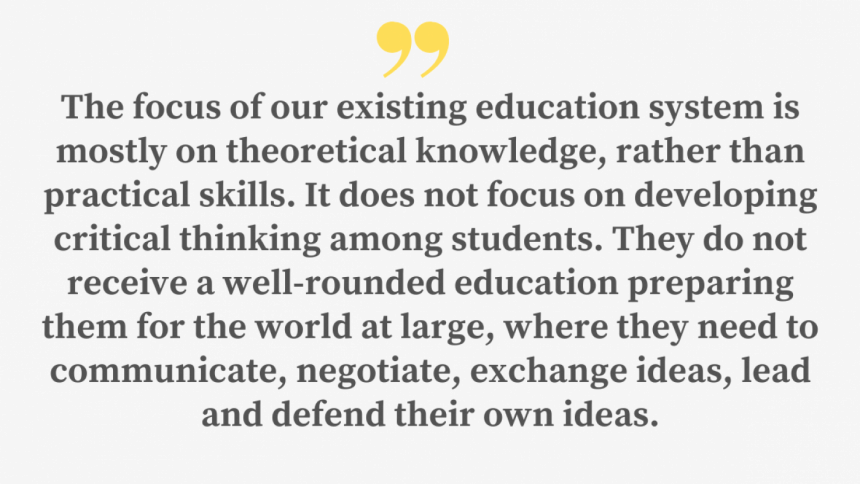Originally posted in The Daily Star on 13 February 2023
 Good education and appropriate skills are basic requirements not only for reaping better opportunities for the youth, but also for building a prosperous economy. Bangladesh has made tremendous strides in economic growth over the last 50 years, which was driven by its people. However, its full potential remains untapped since many young people are still not able to contribute to the economy due to a lack of suitable skills and knowledge. This is depriving them to earn more for themselves and give more to their nation.
Good education and appropriate skills are basic requirements not only for reaping better opportunities for the youth, but also for building a prosperous economy. Bangladesh has made tremendous strides in economic growth over the last 50 years, which was driven by its people. However, its full potential remains untapped since many young people are still not able to contribute to the economy due to a lack of suitable skills and knowledge. This is depriving them to earn more for themselves and give more to their nation.
Bangladesh’s greatest strength is its large young population. The size of the country’s working age population is bigger than that of dependents. Many East Asian countries, such as China, Japan and Singapore, do not have such a demographic dividend, which has become a concern for them. Of course, in the latter half of the 20th century, the East Asian countries advanced rapidly due to their demographic dividends. However, the high number of working-age people in Bangladesh will not stay so for long – experts suggest our demographic dividend will decline by 2040. Therefore, we need to invest in our young population – on quality education and skills – now to reap the benefits.

Our current labour market is in a paradoxical situation. On the one hand, many educated people are unemployed; on the other, employers are in search of qualified people. Youth unemployment rate in Bangladesh is 10.6 percent, though the national average unemployment rate is 4.2 percent. The Labour Force Survey 2016-17 revealed that unemployment among the youth with secondary-level education is 28 percent, while it is 13.4 percent among the youth with tertiary-level education.
This implies that higher education does not necessarily guarantee a job. Youth with higher education remain unemployed because there are limited job opportunities in the country. Many of them also do not want to engage in informal and/or low-paid jobs. On the other hand, employers are looking for a qualified workforce, but many youth who are looking for a job do not fulfil their demand for skills and capacity. So, despite being university graduates, these youth’s employability is low.

Our education system does not equip students with the necessary skills for the job market. The focus of our existing education system is mostly on theoretical knowledge, rather than practical skills. It does not focus on developing critical thinking among students. They do not receive a well-rounded education preparing them for the world at large, where they need to communicate, negotiate, exchange ideas, lead and defend their own ideas. At the school-level education, we see a race for GPA 5, golden GPA, etc. Authorities take credit for such achievements. Sadly, those results cannot take the students far since many do not even learn properly what is taught in class. Many such students cannot even write a sentence correctly either in Bangla or English. Their skills in mathematics and science are also found to be poor. Getting into good universities for higher education becomes a challenge for these students. Many get admitted into private universities since there are several such universities whose quality is questionable. But desperate students and their parents spend large amounts of money for a degree. Alas! These degrees become a liability for so many of them once they graduate.
So, recruiters often face difficulty in finding the ideal candidate for the task they want to assign. There is a mismatch between employers’ demands and the applicants’ skill sets. Because of the low employability of our own labour force, employers are recruiting skilled workforce from the neighbouring countries.
A few universities have taken some initiatives to make their curricula more practical and provide their students with exposure to the world of work. But that is slow and limited. They are connecting students with businesses and industries to help them understand how the real world works and what type of skills they need. Such initiatives should be adopted in other educational institutions, and they should be expedited and scaled up.
Employers also have a critical role to play for bridging the skill gap among the youth. By providing on-the-job training and internship opportunities, they can help young workers acquire the skills they need to succeed in their careers. Indeed, addressing the skill deficit requires a collaborative effort from both the educational institutions and employers. The private sector should also provide skill development opportunities. They can extend apprenticeships and set up training institutes for our youth.
The government must invest heavily in human capital. It recently announced plans to build a “Smart Bangladesh.” This dream can only be fulfilled through investment in the development of our young people so that they are highly skilled and trained to take up the challenge in a world that is ever changing. Sector-specific skills and knowledge are needed to develop their capacity, improve productivity, and develop entrepreneurship. Public expenditure on education should be at least doubled from the current two percent of our GDP. The objective of higher spending should be bringing about tangible results.
Along with education, our youth should be given more opportunities for technical and vocational training. The expectation of employers is unmet in case of vocational and technical training as well. Many employers find those skills not very useful for their organisations. Skill development should be forward-looking and consider the market realities. The requirements and nature of our job market is changing very fast. So, training is needed not just for the present, but for the future as well.
There is also a growing demand for workers who have technical skills and expertise, since the use of technology at the workplace is increasing. The digital transformation of many industries requires a different skill set than those of traditional jobs. So, people who can adapt to the new technological demands will have a competitive advantage in the job market. So, the training centres should provide professional and technical skills to create a workforce that is equipped to meet those demands – a Smart Workforce for a Smart Bangladesh.
Dr Fahmida Khatun is executive director at the Centre for Policy Dialogue (CPD). Views expressed in the article are the author’s own.


